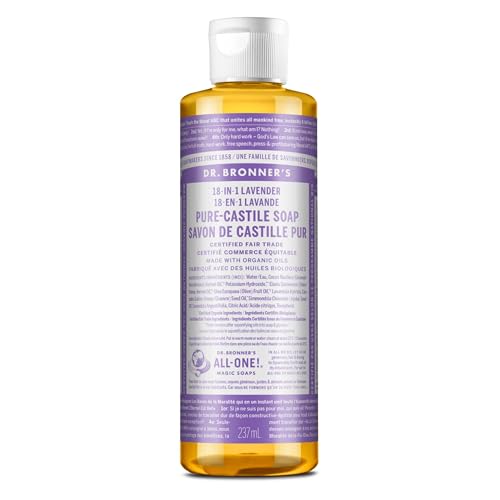
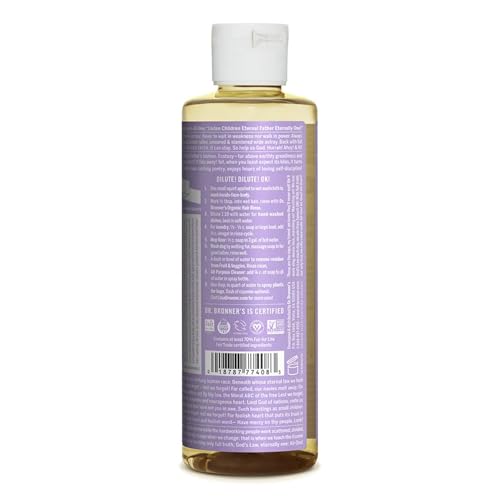
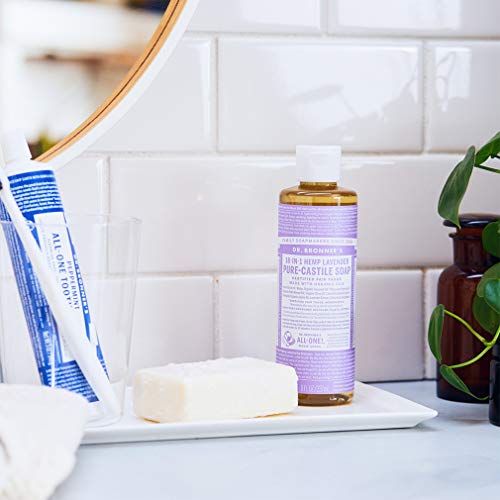

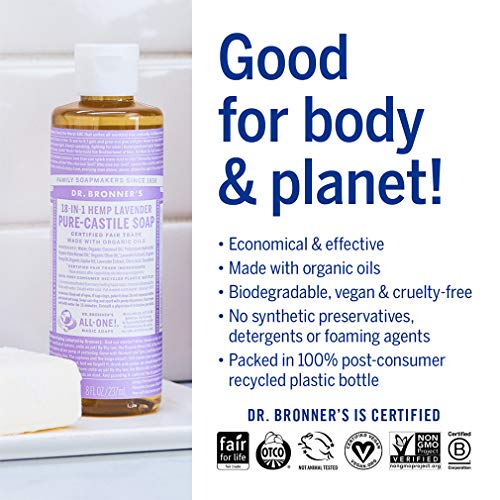
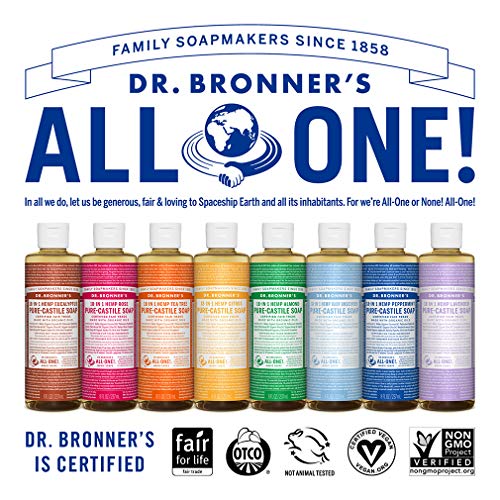
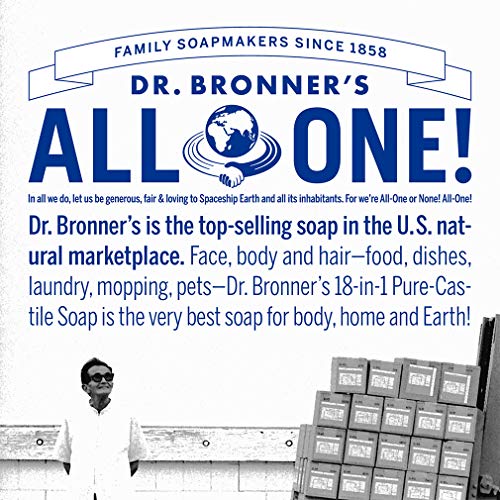
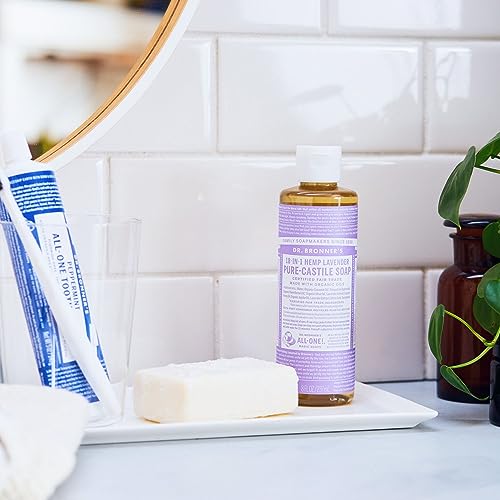
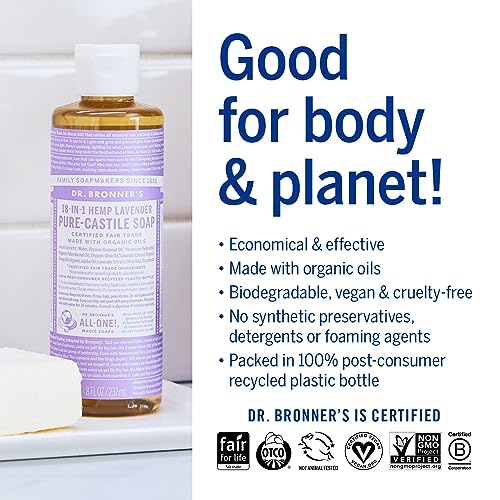

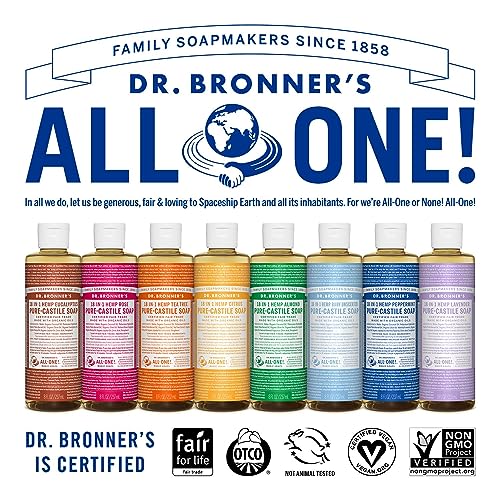

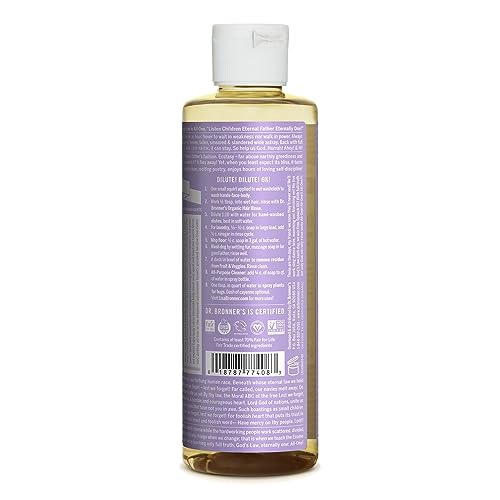
Dr. Bronner's Body Soap - Organic Oils, 18-in-1 Uses, Vegan, Non-GMO - Lavender, 8oz


Rosmarinus Officinalis (Rosemary) Leaf Extract
Medium RiskRosemary leaf extract is produced from the leaves of the Rosmarinus officinalis plant. It is commonly used in cosmetic formulations for its potential antioxidant properties and fragrance. The extract may also contribute to the preservation of products due to its antimicrobial characteristics.
Sustai Insights
Rosemary leaf extract offers functional benefits such as antioxidant and antimicrobial properties, which can enhance product stability and shelf-life. It is generally considered low risk for carcinogenicity and reproductive toxicity, but it carries a moderate potential for allergic reactions. Environmentally, it poses low risk with no significant pollutant or bioaccumulation concerns. Regulatory bodies have not placed significant restrictions on its use, although some verified products cannot contain certain concentrations. Overall, the ingredient's risk level is medium, necessitating careful usage practices to mitigate allergic responses.
Cocos Nucifera (Coconut)
Medium RiskCocos Nucifera, commonly known as coconut, is derived from the coconut palm. It is widely used in various cosmetic and personal care products for its moisturizing properties, acting as an emollient and skin-conditioning agent, enhancing texture and hydration.
Sustai Insights
Cocos Nucifera offers functional benefits such as effective moisturization and conditioning for the skin, while being biodegradable and often sustainably sourced. Health risks are minimal, with low concerns for carcinogenicity, allergies, and reproductive toxicity. Environmental risks are also low, as it does not accumulate in organisms or significantly pollute. Regulatory bodies do not impose restrictions, supporting its overall low-risk status. Safe usage practices include patch testing for sensitivities, though alternatives like shea butter or jojoba oil may offer similar benefits.
Olea Europaea (Olive) Oil
Low RiskOlea europaea (olive) oil is derived from the ripe fruit of the olive tree. It is commonly used in cosmetic formulations primarily as a moisturizer and emollient due to its nourishing properties for the skin. It also serves as a carrier oil for other ingredients in formulations.
Sustai Insights
Olea europaea (olive) oil offers numerous functional benefits, including effective moisturization and enhanced skin absorption properties, making it suitable for various cosmetic applications. It is a biodegradable ingredient, contributing to sustainability when sourced responsibly. Health risks are low, with minimal concerns regarding carcinogenicity, allergenic potential, and developmental toxicity. Environmental risks are also low, with no significant bioaccumulation or pollution potential noted. Regulatory bodies do not impose restrictions on its use. Overall, olive oil presents a low risk profile, making it a favorable choice in cosmetic products.
Water
Low RiskWater is a clear, colorless liquid essential for various biological processes. It serves as a solvent in formulations, facilitating the dissolution of other ingredients and enhancing product texture and application. Additionally, water plays a crucial role in hydration and is a key component in many cosmetic and personal care products.
Sustai Insights
Water is an effective solvent and hydrator, contributing to the texture and efficacy of formulations. It is biodegradable and generally regarded as safe, with low concerns regarding carcinogenicity, allergies, and reproductive toxicity. However, excessive water usage can lead to environmental concerns, particularly regarding resource depletion. Regulatory bodies do not impose restrictions on water use in cosmetics. Overall, the risks associated with water are low, making it a safe and essential ingredient.
Cannabis Sativa (Hemp)
Low RiskCannabis sativa, commonly known as hemp, is a plant species utilized in various products for its fibers, seeds, and oils. It is known for its potential applications in textiles, cosmetics, and food products due to its nutritional and functional properties.
Sustai Insights
Cannabis sativa offers functional benefits such as providing essential fatty acids and serving as a natural emulsifier in formulations. It is generally regarded as low risk regarding health concerns, with minimal evidence of carcinogenicity, allergenic potential, or reproductive toxicity. Environmentally, it poses low pollutant risk and is often sustainably sourced. Regulatory bodies impose few restrictions on its use, affirming its safety. Overall, the ingredient is assessed as low risk, making it a viable option in various applications.
Fatty Acids
Low RiskFatty acids are organic compounds composed of long hydrocarbon chains with a carboxyl group at one end. They serve various functions in cosmetic formulations, including acting as emollients, emulsifiers, and surfactants, contributing to product texture and stability.
Sustai Insights
Fatty acids offer functional benefits such as enhancing skin hydration and improving product consistency. They are generally recognized as safe by regulatory bodies, with low concerns regarding carcinogenicity, allergies, and reproductive toxicity. Environmental risks are minimal, as they are often biodegradable and not bioaccumulative. Regulatory agencies have not issued significant warnings against their use. Overall, fatty acids present a low risk profile, making them a favorable choice in cosmetic applications. Safe usage practices should be followed, and alternatives include plant-based oils for sustainability.
Olea Europaea (Olive) Oil
Low RiskOlea europaea (olive) oil is derived from the ripe fruit of the olive tree. It is commonly used in cosmetic formulations primarily as a moisturizer and emollient due to its nourishing properties for the skin. It also serves as a carrier oil for other ingredients in formulations.
Sustai Insights
Olea europaea (olive) oil offers numerous functional benefits, including effective moisturization and enhanced skin absorption properties, making it suitable for various cosmetic applications. It is a biodegradable ingredient, contributing to sustainability when sourced responsibly. Health risks are low, with minimal concerns regarding carcinogenicity, allergenic potential, and developmental toxicity. Environmental risks are also low, with no significant bioaccumulation or pollution potential noted. Regulatory bodies do not impose restrictions on its use. Overall, olive oil presents a low risk profile, making it a favorable choice in cosmetic products.
Water
Low RiskWater is a clear, colorless liquid essential for various biological processes. It serves as a solvent in formulations, facilitating the dissolution of other ingredients and enhancing product texture and application. Additionally, water plays a crucial role in hydration and is a key component in many cosmetic and personal care products.
Sustai Insights
Water is an effective solvent and hydrator, contributing to the texture and efficacy of formulations. It is biodegradable and generally regarded as safe, with low concerns regarding carcinogenicity, allergies, and reproductive toxicity. However, excessive water usage can lead to environmental concerns, particularly regarding resource depletion. Regulatory bodies do not impose restrictions on water use in cosmetics. Overall, the risks associated with water are low, making it a safe and essential ingredient.
Rosmarinus Officinalis (Rosemary) Leaf Extract
Medium RiskRosemary leaf extract is produced from the leaves of the Rosmarinus officinalis plant. It is commonly used in cosmetic formulations for its potential antioxidant properties and fragrance. The extract may also contribute to the preservation of products due to its antimicrobial characteristics.
Sustai Insights
Rosemary leaf extract offers functional benefits such as antioxidant and antimicrobial properties, which can enhance product stability and shelf-life. It is generally considered low risk for carcinogenicity and reproductive toxicity, but it carries a moderate potential for allergic reactions. Environmentally, it poses low risk with no significant pollutant or bioaccumulation concerns. Regulatory bodies have not placed significant restrictions on its use, although some verified products cannot contain certain concentrations. Overall, the ingredient's risk level is medium, necessitating careful usage practices to mitigate allergic responses.
Cocos Nucifera (Coconut)
Medium RiskCocos Nucifera, commonly known as coconut, is derived from the coconut palm. It is widely used in various cosmetic and personal care products for its moisturizing properties, acting as an emollient and skin-conditioning agent, enhancing texture and hydration.
Sustai Insights
Cocos Nucifera offers functional benefits such as effective moisturization and conditioning for the skin, while being biodegradable and often sustainably sourced. Health risks are minimal, with low concerns for carcinogenicity, allergies, and reproductive toxicity. Environmental risks are also low, as it does not accumulate in organisms or significantly pollute. Regulatory bodies do not impose restrictions, supporting its overall low-risk status. Safe usage practices include patch testing for sensitivities, though alternatives like shea butter or jojoba oil may offer similar benefits.
Cannabis Sativa (Hemp)
Low RiskCannabis sativa, commonly known as hemp, is a plant species utilized in various products for its fibers, seeds, and oils. It is known for its potential applications in textiles, cosmetics, and food products due to its nutritional and functional properties.
Sustai Insights
Cannabis sativa offers functional benefits such as providing essential fatty acids and serving as a natural emulsifier in formulations. It is generally regarded as low risk regarding health concerns, with minimal evidence of carcinogenicity, allergenic potential, or reproductive toxicity. Environmentally, it poses low pollutant risk and is often sustainably sourced. Regulatory bodies impose few restrictions on its use, affirming its safety. Overall, the ingredient is assessed as low risk, making it a viable option in various applications.
Fatty Acids
Low RiskFatty acids are organic compounds composed of long hydrocarbon chains with a carboxyl group at one end. They serve various functions in cosmetic formulations, including acting as emollients, emulsifiers, and surfactants, contributing to product texture and stability.
Sustai Insights
Fatty acids offer functional benefits such as enhancing skin hydration and improving product consistency. They are generally recognized as safe by regulatory bodies, with low concerns regarding carcinogenicity, allergies, and reproductive toxicity. Environmental risks are minimal, as they are often biodegradable and not bioaccumulative. Regulatory agencies have not issued significant warnings against their use. Overall, fatty acids present a low risk profile, making them a favorable choice in cosmetic applications. Safe usage practices should be followed, and alternatives include plant-based oils for sustainability.
Experience the refreshing power of Dr. Bronner's Pure-Castile Liquid Soap in Lavender. This versatile, concentrated soap is crafted with over 70% organic and Fair Trade ingredients, making it a smart choice for your body and the planet.
- Organic & Fair Trade Ingredients: Made with ethically sourced palm kernel oil, ensuring sustainable harvesting practices that benefit local communities and ecosystems.
- Plant-Powered Purity: Free from synthetic preservatives and foaming agents, this soap is gentle on the skin and a fantastic eco-friendly option.
- 18-in-1 Versatility: Use it for everything from body washing to laundry, dishes, and even pet care—one soap, countless uses, reducing waste and packaging.
- Highly Concentrated Formula: Three times more concentrated than standard soaps, allowing for efficient dilution and more uses per bottle, promoting cost-effectiveness.
- Eco-Friendly Packaging: Packaged in 100% post-consumer recycled plastic, helping divert waste from landfills and supporting a circular economy.
Choose Dr. Bronner's for a cleaner, greener lifestyle that aligns with your values.
Subscribe & Save with Sustai
- Best Price Guarantee: Always enjoy the lowest prices on sustainable home essentials.
- No Surprises: We’ll notify you before shipping. No hidden fees, ever.
- You’re in Charge: Change, pause, or cancel your subscription anytime with ease.
- Eco-Friendly Deliveries: Our grouped shipments mean less packaging and lower emissions.
Join us on a sustainable journey. Special offers for a limited time! Prices and promotions may change.
Recommended Products
Experience the refreshing power of Dr. Bronner's Pure-Castile Liquid Soap in Lavender. This versatile, concentrated soap is crafted with over 70% organic and Fair Trade ingredients, making it a smart choice for your body and the planet.
- Organic & Fair Trade Ingredients: Made with ethically sourced palm kernel oil, ensuring sustainable harvesting practices that benefit local communities and ecosystems.
- Plant-Powered Purity: Free from synthetic preservatives and foaming agents, this soap is gentle on the skin and a fantastic eco-friendly option.
- 18-in-1 Versatility: Use it for everything from body washing to laundry, dishes, and even pet care—one soap, countless uses, reducing waste and packaging.
- Highly Concentrated Formula: Three times more concentrated than standard soaps, allowing for efficient dilution and more uses per bottle, promoting cost-effectiveness.
- Eco-Friendly Packaging: Packaged in 100% post-consumer recycled plastic, helping divert waste from landfills and supporting a circular economy.
Choose Dr. Bronner's for a cleaner, greener lifestyle that aligns with your values.

You can have at most 2 Sustainable Steals products in your cart
Customer Reviews
Customers’ View
Customers express satisfaction with the effectiveness and pleasant lavender scent of the Body Soap, appreciating its versatility for multiple uses, including body washing and dish cleaning. Many highlight the soap's quality, noting it leaves skin feeling soft and clean without any residue. Users particularly value the organic and fair trade ingredients, aligning with their eco-friendly values. While the product is generally well-received for its moisturizing properties, some customers have mixed feelings about its value for money, with opinions varying on whether it justifies the price. Overall, customers find this soap an effective choice that supports a sustainable lifestyle.
AI-generated from the text of customer reviewsThis product has no reviews yet.




